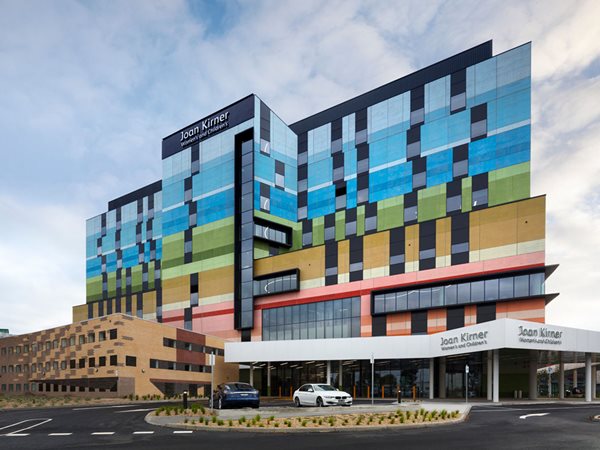

Salutogenic design: The hospital that puts patients first
The Joan Kirner Women’s and Children’s Hospital is a new state-of-the-art hospital that uses salutogenic design techniques to create a better space for patients, visitors and staff.

The Joan Kirner Women’s and Children’s Hospital is a new state-of-the-art hospital in Melbourne’s West.
Facilities
The nine-storey design accommodates wide-ranging facilities including an entire birthing floor, comprising 20 birthing suites and four birthing pools. Out-patient clinics, imaging facilities, operating theatres, a special-care nursery (including a neonatal intensive care unit), a short-stay paediatric ward, and new inpatient wards, are all among the carefully considered layout.
Salutogenic design
Designed by Lyons Architecture, the space maximises nature views to orientate patients and visitors, as well as to help lower anxiety and stress levels.

The firm’s founder and University of Melbourne professor, Corbett Lyon, is a leading advocate of salutogenic design, which refers to the configuration and planning of spaces to reduce stress and enhance the experience of patients and families.
Lyon is currently part of a research team investigating the impact of paediatric hospital design on the experience of patients, parents and staff. The outcome of this research will be the creation of a set of design guidelines to be used by architects and government agencies.
Aesthetic features

Throughout the design, there is a repetition of geometry.
“A circular motif has been used to represent layered meanings of life cycles, organic formations, spectrums and community circles and this has been encoded across the interior from the structural floorplates, flooring, joinery and bulkheads, right through to lily pads for children to sit on,” says Lyons associate and co-designer Lucinda Arundel.

In addition to serving as a contrast to the hospital’s rectangular façade, the circles also act as an internal navigation aid. Patients and family members can literally ‘join the dots’ to locate wards via a simple colour code.
Outside, the building’s colourful facade fulfils Western Health’s aspiration to provide the community with a hospital that is both contextual and joyful.
“We extensively photographed the area, sampled pixels and then reflected those tones within the façade,” says Arundel.
“The lower green levels reflect gardens of the region, whilst higher up we’ve used orange to represent the suburb’s tiled roofs and, yet further up the façade, we’ve used tones indicative of a cloudscape.
“Whilst it is fundamentally a place of caring and the provision of health services, it is also full of comforting finishes, colours, artworks and vistas — all of which are designed to honour patients and care givers alike.”



